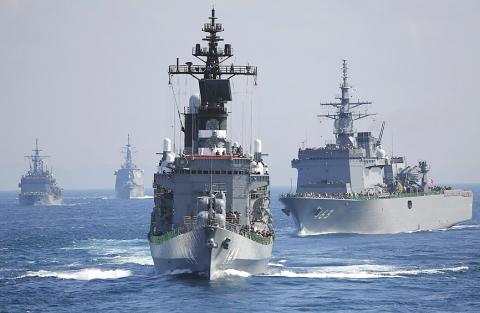The Japanese Cabinet yesterday approved a record-high military spending plan, endorsing plans to purchase pricey US surveillance drones and F-35 jets as Tokyo steps up cooperation with Washington amid China’s increasingly assertive activity in regional seas.
The ¥5.1 trillion (US$42.1 billion) proposal is part of a ¥96.7 trillion national budget for the fiscal year beginning in April, also an all-time high. The entire package requires Japanese parliamentary approval.
Military spending would rise 1.5 percent from this year, the fourth annual increase under Japanese Prime Minister Shinzo Abe, who ended a decade of defense budget cuts.

Photo: AP
The defense budget is the first since Japan enacted new security legislation in September enhancing the nation’s military role and since Japan revised its bilateral defense guidelines with the US earlier in the year to allow broader cooperation between the allies.
The new security law divided Japanese public opinion, with opponents saying it would increase a possibility of Japan being embroiled in a US-led war.
Japan is bolstering surveillance and defense of its southern islands, where it has a territorial dispute with China.
The budget also includes the purchase of an advanced Aegis radar-equipped destroyer with missile-defense capability, submarine construction and sonar development.
The Japanese Ministry of Defense plans to spend ¥14.8 billion this year on some of the multibillion-dollar, multi-year purchase of three “Global Hawk” unmanned drones, as well as six F-35 jets for ¥138 billion and a Boeing mid-air refueling aircraft KC-46A at ¥23 billion.
“We believe the budget includes items that would contribute to enhancing Japan-US cooperation in the area of ISR,” Japanese Ministry of Defense official Tomoki Matsuo said, referring to information, surveillance and reconnaissance.
Japan pays ¥193 billion for about 50,000 US troops stationed in Japan under their bilateral security treaty, more than half of them on Okinawa — a major source of friction between the central government and the southern island, which is frustrated with the decades-long burden.
The cost to move some of them to Guam and a contentious plan to move the US Marine air base from the crowded Futenma area to a less-populated location on Okinawa was also added to the budget.

MAKING WAVES: China’s maritime militia could become a nontraditional threat in war, clogging up shipping lanes to prevent US or Japanese intervention, a report said About 1,900 Chinese ships flying flags of convenience and fishing vessels that participated in China’s military exercises around Taiwan last month and in January last year have been listed for monitoring, Coast Guard Administration (CGA) Deputy Director-General Hsieh Ching-chin (謝慶欽) said yesterday. Following amendments to the Commercial Port Act (商港法) and the Law of Ships (船舶法) last month, the CGA can designate possible berthing areas or deny ports of call for vessels suspected of loitering around areas where undersea cables can be accessed, Oceans Affairs Council Minister Kuan Bi-ling (管碧玲) said. The list of suspected ships, originally 300, had risen to about

DAREDEVIL: Honnold said it had always been a dream of his to climb Taipei 101, while a Netflix producer said the skyscraper was ‘a real icon of this country’ US climber Alex Honnold yesterday took on Taiwan’s tallest building, becoming the first person to scale Taipei 101 without a rope, harness or safety net. Hundreds of spectators gathered at the base of the 101-story skyscraper to watch Honnold, 40, embark on his daredevil feat, which was also broadcast live on Netflix. Dressed in a red T-shirt and yellow custom-made climbing shoes, Honnold swiftly moved up the southeast face of the glass and steel building. At one point, he stepped onto a platform midway up to wave down at fans and onlookers who were taking photos. People watching from inside

Japan’s strategic alliance with the US would collapse if Tokyo were to turn away from a conflict in Taiwan, Japanese Prime Minister Sanae Takaichi said yesterday, but distanced herself from previous comments that suggested a possible military response in such an event. Takaichi expressed her latest views on a nationally broadcast TV program late on Monday, where an opposition party leader criticized her for igniting tensions with China with the earlier remarks. Ties between Japan and China have sunk to the worst level in years after Takaichi said in November that a hypothetical Chinese attack on Taiwan could bring about a Japanese

The WHO ignored early COVID-19 warnings from Taiwan, US Deputy Secretary of Health and Human Services Jim O’Neill said on Friday, as part of justification for Washington withdrawing from the global health body. US Secretary of State Marco Rubio on Thursday said that the US was pulling out of the UN agency, as it failed to fulfill its responsibilities during the COVID-19 pandemic. The WHO “ignored early COVID warnings from Taiwan in 2019 by pretending Taiwan did not exist, O’Neill wrote on X on Friday, Taiwan time. “It ignored rigorous science and promoted lockdowns.” The US will “continue international coordination on infectious